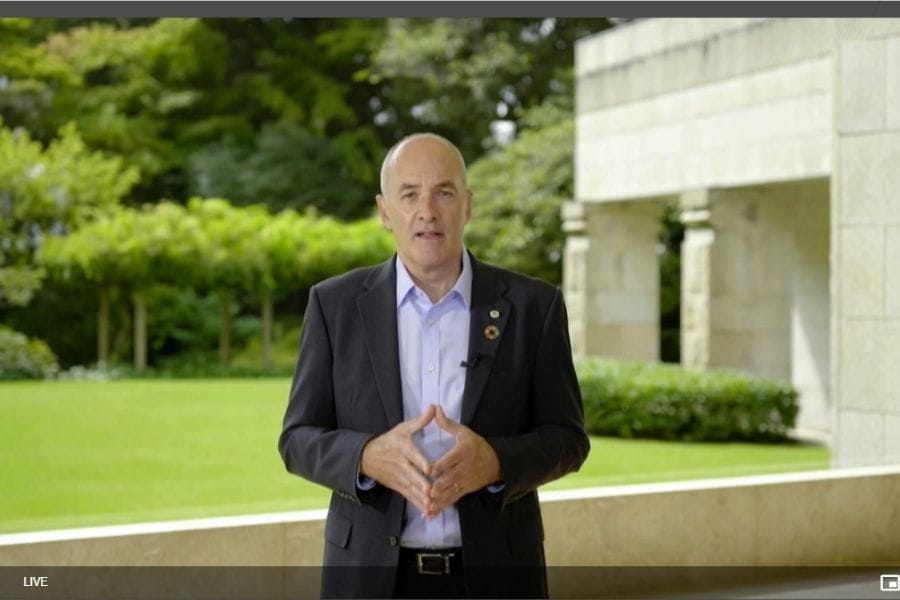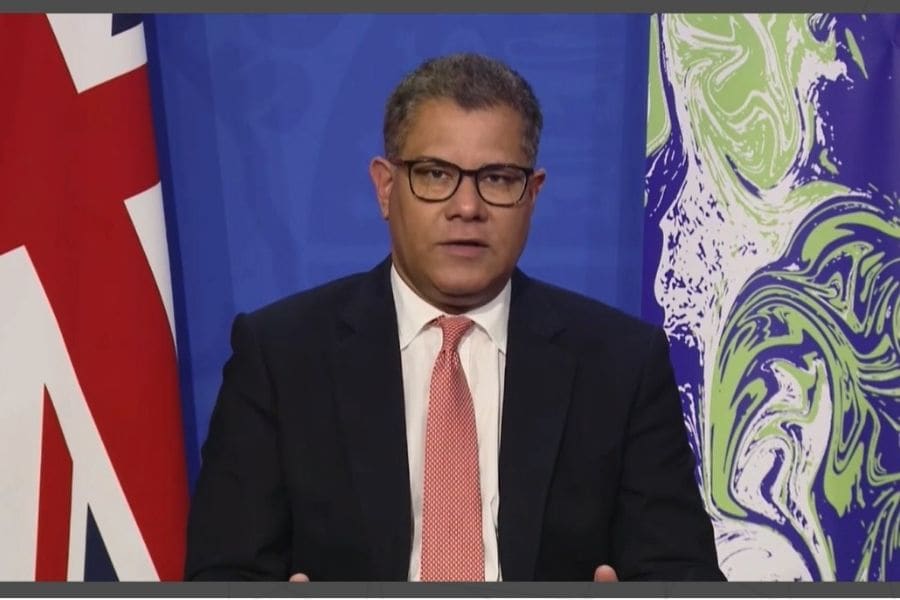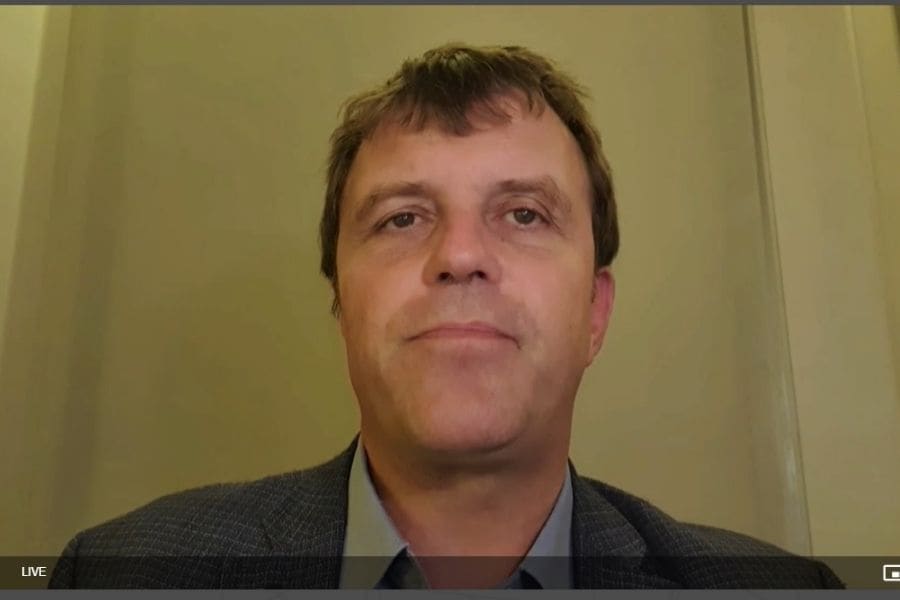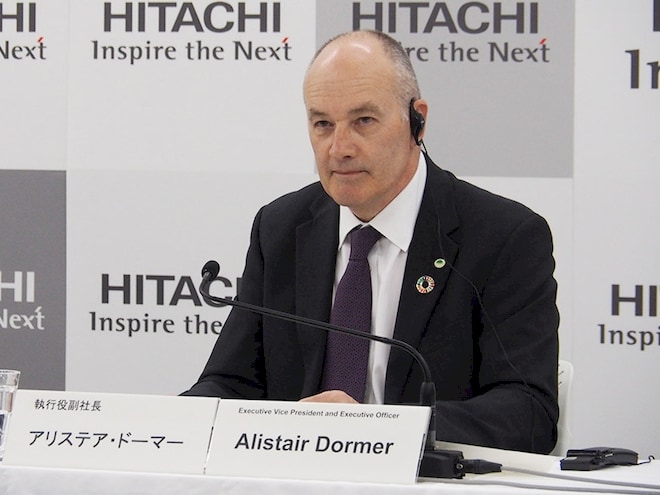President of COP26 Alok Sharma: Corporate Innovation Vital for Tackling Climate Change
Oct. 27, 2021
Akihiko Nakasaku

The “Hitachi Social Innovation Forum (HSIF) 2021 JAPAN,” hosted by Hitachi, was held online from October 11 to 15. HSIF is the largest event held by the Hitachi Group, and its mandate is to introduce initiatives for thinking about and solving climate change and other challenges currently facing the world.
On the first day, October 11, a lecture was held as a highlight session with the topic of tackling climate change, and, as a prelude to the United Nations Climate Change Conference (COP26), which is to be held in Glasgow, United Kingdom, President of COP26 Alok Sharma spoke at this session. In order to reduce greenhouse gas emissions, he stated: “We need the energy and the innovation of business on our side.”
Alistair Dormer, the executive vice president and chief environmental officer of Hitachi Ltd., spoke on behalf of Hitachi, a principal partner of COP26, expressing his resolve: “As a climate change innovator, we believe Hitachi needs to lead by example.”
The Power of Technology: Key to Solving the Climate Change Crisis

The first speaker was Alistair Dormer, the executive vice president,and chief environmental officer of Hitachi Ltd., who is tackling initiatives to solve environmental issues. In regard to the climate change crisis, Dormer pointed out that the situation is something that “nations, governments, and business need to work on together,” and “climate change is certainly the most important challenge of our time.”
Dormer noted three points from the Sixth Assessment Report compiled by the Intergovernmental Panel on Climate Change (IPCC) published in August 2021:
- We are closer to irreversible tipping points.
- Human activity is driving extreme weather.
- We are set to pass 1.5°C warming by 2040.
Based on these points, he emphasized: “There is no time to waste if we are to preserve our beautiful planet for future generations. To act now is the imperative of our time. And we need to act together. But in order to do this, we need more businesses to set net zero targets and join the Race To Zero.”
Race To Zero is a global campaign sponsored by the secretariat of the United Nations Framework Convention on Climate Change (UNFCC) to rally leadership from businesses, investors, local governments, and other actors outside of national governments for the purpose of accelerating action on climate change in the real economy.
To participate, actors must “commit to achieving net zero carbon emissions by 2050 at the latest.” Currently, more than 3,000 companies are participating in the Race To Zero—with Hitachi being one of them.
Dormer said: “There is no doubt in my mind that Japan has a key role to play in the innovation that will accelerate the energy transition. Japan, as a nation, has a rich heritage of technological innovation, and this will need to be at the fore if we are to solve the climate crisis.”
COP26: Our “last chance”

Next to speak was President of COP26 Alok Sharma. He pointed out: “Climate change has now reached a critical point. The signs are all around us.”
“In the recent report (Sixth Assessment Report) by the IPCC, the latest science was a real wake-up call for all of us. The report states unequivocally that climate change is affecting every region on Earth, that human activity is the cause, and that we are running out of time to avoid its worst effects. Frankly, the lights are flashing red on the climate dashboard.”
The Paris Agreement was adopted at COP21, held in 2015. In the agreement, parties agreed to hold the increase in the global average temperature to well below 2°C above pre-industrial levels (i.e., the average of 1850 to 1900) and to pursue efforts to limit the temperature increase to 1.5°C above pre-industrial levels.
However, initiatives by countries to limit global warming are insufficient, and scientists say that with the current level of action it will be difficult to limit temperature increase to below 2°C above pre-industrial levels.
Sharma claims that greater action is needed to limit global warming.
“To keep the 1.5°C target alive, we must act now, and that is what makes COP26 so vitally important. Frankly, this is our last best chance of keeping 1.5°C alive, and doing so requires us all to act.”
Sharma pointed out: “We need rapid change across the global economy, and that depends on governments, businesses, investors, and civil society all playing their part to accelerate the transition to a clean economy.” Moreover, he explained: “What we need to do at COP26 is to get this green transition moving faster with the over-arching aim of keeping 1.5°C alive.”
The “clean economy” is an economy that focuses on sustainable activities through net zero emissions. To accomplish the transition to a clean economy, the following four goals have been formulated for COP26:
- The world must set ambitious targets to reduce greenhouse gas emissions and to reach net zero by the middle of the century.
- Protect communities and natural habitats from the effects of climate change.
- Inject both public- and private-sector funds into climate change action to mobilize sufficient financing.
- Work together in collaboration with businesses, investors, and civil society.
Sharma introduced these four goals and called for cooperation to achieve the 1.5°C target.
“We need the energy and the innovation of business on our side. We can only rise to the climate challenge by working together, so I want to thank Hitachi for all its support for COP26, and I urge everyone listening to work with us to drive down emissions to help Japan, indeed the world, reach net zero so that we can keep 1.5°C alive.”
Supported by Japanese technologies and Innovation

The next speaker after Sharma was Nigel Topping, High Level Climate Action Champion, COP26.
The High Level Climate Action Champion initiative began at COP22. Every year, two environmental experts are appointed. This is a role that encourages independent action by local governments, businesses, and other non-state actors. At COP26, the High Level Climate Action Champions’ responsibility will be to play a leading role in the Race To Zero campaign.
Topping emphasized the current state of climate change, saying: “Action on climate change is more urgent than ever. The recent IPCC report (Sixth Assessment Report) has confirmed this in the clearest possible terms. The Secretary-General of the United Nations has called this report a code red for humanity.”
And he said that the Race To Zero, which he is leading, “has more than 4,500 members from across the world's corporations, investors, and local governments, but I'd say only about 35 these are Japanese corporations,” giving a wake-up call to Japanese companies.
“There's a huge commercial opportunity to lead the pack in pursuing the new Industrial Revolution, to reap the rewards of the technology and innovation that can set us on a path to achieving net zero as quickly as possible. In technology and innovation, Japan, perhaps more than any other country, has natural advantages that should see it enter the race with real confidence.”
Leaving behind the tools to build humanity’s future
One of Hitachi’s major commitments is to achieve carbon neutrality—first across all our factories and offices worldwide by FY2030—and then across our entire global value chain by FY2050. Dormer spoke about this challenge.
“As a climate change innovator, we believe Hitachi needs to lead by example. One of our major commitments is to achieve carbon neutrality. These new targets underline our commitment to play a key role in decarbonization.”
Moreover, Dormer showcased the projects that Hitachi is tackling in the mobility and energy fields and talked about the importance of research and development. He also emphasized the necessity to pass the baton on to the next generation.
“We will have to pass on the baton, and that is where the next generation can make the difference. I’m looking forward to seeing the younger generation step up. To shape their future. And to shape our future. But it’s our generation’s responsibility to hand them the necessary tools to begin with.”
We are at a major turning point in the battle against climate change. Dormer wrapped up his speech with the following comment:
“Now is the time for governments and businesses to come together to forge a better path. All of us—without exception—are members of the global team tasked with the challenge. From Hitachi’s point of view, our responsibility to society is to accelerate the Race to Zero and the energy transition by encouraging, motivating, and supporting our partners to do the same. We’re looking forward to co-creating with governments, business partners, and people around the world to continue on this demanding but incredible journey.”



